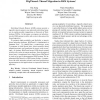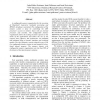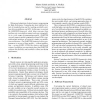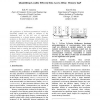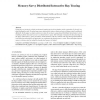107
click to vote
IPPS
2002
IEEE
15 years 7 months ago
2002
IEEE
Software-based distributed shared memory (DSM) systems do usually not provide any means to use shared memory regions as stacks or via an efficient heap memory allocator. Instead ...
125
click to vote
ICPPW
2002
IEEE
15 years 7 months ago
2002
IEEE
Distributed Shared Memory (DSM) systems provide a logically shared memory over physically distributed memory to enable parallel computation on Networks of Workstations (NOWs). In ...
110
click to vote
DSD
2002
IEEE
15 years 7 months ago
2002
IEEE
A configurable memory organisation for the execution of Hiperlan/2 transceiver baseband processing and MPEG2 decoding is presented. The configuration of the memory system is done ...
125
click to vote
CCGRID
2002
IEEE
15 years 7 months ago
2002
IEEE
Despite the large research efforts in the SW–DSM community, this technology has not yet been adapted widely for significant codes beyond benchmark suites. One of the reasons co...
109
click to vote
IPPS
2003
IEEE
15 years 7 months ago
2003
IEEE
Widespread adaptation of shared memory programming for High Performance Computing has been inhibited by a lack of standardization and the resulting portability problems between pl...
126
click to vote
IPPS
2003
IEEE
15 years 7 months ago
2003
IEEE
The application of hardware-parameterized models to distributed systems can result in omission of key bottlenecks such as the full cost of inter-node communication in a shared mem...
117
click to vote
PDCAT
2004
Springer
15 years 7 months ago
2004
Springer
Abstract. This paper proposes a novel View-Oriented Parallel Programming style for parallel programming on cluster computers. ViewOriented Parallel Programming is based on Distribu...
115
click to vote
EUROPAR
2004
Springer
15 years 7 months ago
2004
Springer
Abstract. Fine-grained software-based distributed shared memory (SWDSM) systems typically maintain coherence with in-line checking code at load and store operations to shared memor...
118
click to vote
EGPGV
2004
Springer
15 years 7 months ago
2004
Springer
Interactive ray tracing in a cluster environment requires paying close attention to the constraints of a loosely coupled distributed system. To render large scenes interactively, ...
127
click to vote
ICA3PP
2005
Springer
15 years 7 months ago
2005
Springer
Shared Memory is an interesting communication paradigm for SMP machines and clusters. Weak consistency models have been proposed to improve efficiency of shared memory applications...

